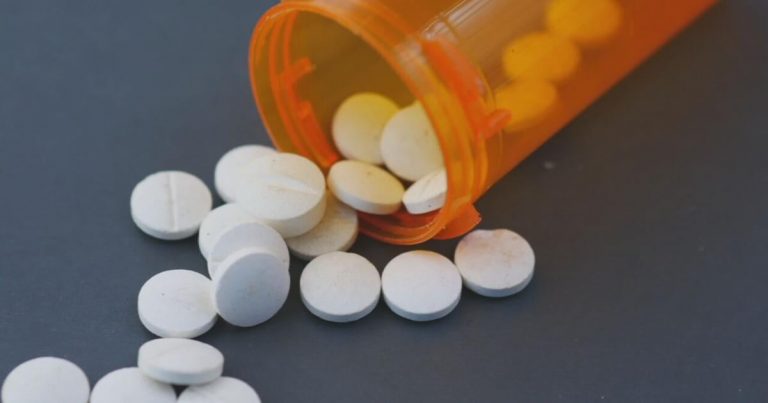LOUISVILLE, Ky. (WDRB) — Numbers show progress is being made in the country’s battle against the opioid epidemic, with fatal overdoses declining over the past two years.
But despite that progress, Black communities are being left behind, experiencing the opposite trend in silence.
There aren’t many parts of the nation that haven’t been touched by the opioid crisis. Thousands of people have been affected by it in some way, and thousands lose their lives to addiction each year.
The approach to bring those numbers down has been all hands on deck. While statistics show it’s working, overdose deaths are rising at alarming rates among Black communities, specifically among Black men.
It’s something Kenneth Hughes has experienced first-hand, watching his brother Rodney fight a battle against addiction.
“You can’t start somebody off at 14 on that many pain killers that strong,” said Hughes. “He was a functioning addict.”
Hughes said Rodney was just 14 years old when he got addicted to opioids, something his family never saw coming after his back surgery to repair a herniated disc.
“When we was younger, he hurt his back and got started on opioids and they just kept increasing them and he got addicted, and he never could kick the habit,” he said. “When you start getting 180 pills at 14, and they just keep on increasing them to 280, 300, it’s hard to stop.”
Rodney Hughes (Courtesy: Kenneth Hughes)
Hughes said his brother, an avid outdoorsman, father and welder, tried to mask his addiction for years.
“He would work, pay his bills, and then the rest of his money would go to pain pills,” he said. “He would talk to you like I’m talking right now and you’d never know he’d taken a pain pill.”
Until one day in 2022, when Rodney died at the age of 41.
“My little brother called and said Rodney was in the back room and he’s (overdosed),” Hughes said. “(I) had just seen him 30 minutes before that and he was fine.”
Stories like Rodney’s are behind the numbers showing disproportionately high overdose rates in Black communities.
The overall overdose rate in Kentucky dropped nearly 10% in the most recent state report, with 1,984 fatal overdoses. But the rate of fatal overdoses among Black residents was 51.8% greater than the rate of deaths among white people. Reports from the National Institute on Drug Abuse show a five-fold increase in fatal overdoses since 2015 among older Black men.
NIDA Director Dr. Nora Volkow wrote in a 2024 article, “Age-related health disparities, social isolation, and lifetime exposure to structural racism, may be colliding to produce the rise in overdoses among older Black men especially, and it points to the urgent need for intervention.”
Cassandra Gray, a licensed alcohol and drug counselor and CEO of Creative Spirits Behavioral Health, said there are fewer practitioners of color. That creates different challenges in getting people rehabilitative care, getting them to stay in treatment and helping them find success when returning to the community.
“It’s hard to be able to reach any of us if I don’t feel like you are able to address my needs or see me,” she said.
It’s a battle Gray said she knows personally, even beyond her clients.
“My nephew is in treatment right now,” she said. “My nephew has (overdosed) 10 times. They’ve had to bring him back 10 times.”
The issue is coming to light as Kentucky figures out what to do with a windfall of cash. Last month, Attorney General Russell Coleman announced a $110 million opioid settlement with Kroger.
“That means investing in treatment. Supporting you in enforcement and investing, especially in prevention, being proactive,” Coleman said at the time.
While the funding and investments came too late for Rodney Hughes, his brother Kenneth said he hopes it will be just in time to save someone else’s life.
“I think they should put Narcan in all the stores and stuff so like people can grab them,” he said. “After he died, I always kept one with me.”
If you or someone you know is struggling with an addiction, there are resources available. For treatment and recovery resources in Kentucky, or to find resources available near you, click here.
You can also call the Kentucky Opioid Assistance and Resource Hotline at (800) 854-6813, or visit their website by clicking here.
Operation UNITE also provides a treatment referral and help line for those looking for help with a substance use disorder. That number is 1-866-908-6483. To look at the treatment programs provided by the organization, click here.
Find Help Now Kentucky provides similar resources. Their number is 1-833-859-4357, which will connect you with a screening and referral specialist. For more information, click here.
The city of Louisville also has a webpage with local treatment and recovery resources, including a list of support groups, a tool to find free naloxone (Narcan) 24/7 and locations for safely disposing of medication. To access those local resources, or learn more, click here.
Related Stories:
Copyright 2025 WDRB Media. All Rights Reserved.





